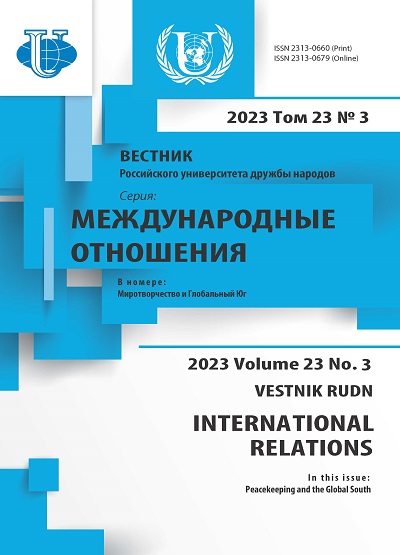The UN Charter is our rules! Interview with Anna M. Evstigneeva, Deputy Permanent Representative of the Russian Federation to the United Nations
- 作者: Evstigneeva A.M.1
-
隶属关系:
- 期: 卷 23, 编号 3 (2023): Peacekeeping and the Global South
- 页面: 497-505
- 栏目: 学派
- URL: https://journals.rudn.ru/international-relations/article/view/36153
- DOI: https://doi.org/10.22363/2313-0660-2023-23-3-497-505
- EDN: https://elibrary.ru/GCAFUX
如何引用文章
详细
The practice of the functioning of the United Nations and the actual mechanisms of peacekeeping differ significantly from the theoretical ideas about them. Anna Mikhailovna Evstigneeva, Deputy Permanent Representative of the Russian Federation to the United Nations (UN), who has been dealing with peacekeeping issues for many years, answers a number of important questions about contemporary peacekeeping and peacebuilding in her interview. She argues that while the West is building a “rules-based order,” for Russia the rules are the UN Charter. The key to ensuring the effectiveness of an international organization, according to A.M. Evstigneeva, is the ability of the parties to reach mutually beneficial solutions and to take each other’s interests into account. The rest is a “superstructure,” which, however, is partially enshrined in the doctrine. Dozens of factors (dialogue with civil society, gender, climate, etc.) play a special role, which over time become universal. Often, the beautiful Western theories of liberal peacebuilding do not stand up to the harsh reality; and in a number of cases there is silence on the part of decision-makers about the real situation on the ground. This interview highlights the challenges of the existing system of international peacekeeping in the context of the formation of a multipolar world.
作者简介
Anna Evstigneeva
编辑信件的主要联系方式.
Email: ir@rudn.ru
Deputy Permanent Representative of the Russian Federation to the United Nations
参考
- Amara, D., Degterev, D. A., & Egamov, B. Kh. (2022). “Common Interest” in the UN peacekeeping operations in Africa: An applied analysis of the personnel. National Strategy Issues, 2(71), 76-101. (In Russian).
- Beckley, C., & Waters, E. (2008). Who holds the moral high ground? Exeter: Imprint Academic.
- Bokeriya, S. A. (2018). R2P: Concept, aspirational norm or principle? Interview with Professor Alex J. Bellamy, University of Queensland (Australia). Vestnik RUDN. International Relations, 18(4), 955-964. https://doi.org/10.22363/2313-0660-2018-18-4-955-964
- Bokeriya, S. A. (2022). The UN - AU partnership in peacekeeping: Tendencies and problems. International Organizations Research Journal, 17(2), 189-207. https://doi.org/10.17323/1996-7845-2022-02-08
- Boulden, J. (2005). Mandates matter: An exploration of impartiality in United Nations operations. Global Governance: A Review of Multilateralism and International Organizations, 11(2), 147-160. https://doi.org/10.1163/19426720-01102003
- Brahimi, L., & Ahmed, S. (2023). In pursuit of sustainable peace. The seven deadly sins of mediation. Center on International Cooperation, New York University. Retrieved from https://peacemaker.un.org/sites/peacemaker.un.org/files/SevenDeadlySinsofMediation_BrahimiAhmed2008.pdf
- Donald, D. (2002). Neutrality, impartiality and UN peacekeeping at the beginning of the 21st century. International Peacekeeping, 9(4), 21-38. https://doi.org/10.1080/714002776
- Huntington, S. P. (1993). The clash of civilizations? Foreign Affairs, 72(3), 22-49. https://doi.org/10.2307/20045621
- Khudaykulova, A. V. (2016). Conflict management in the new century: Back to proxy wars? International Trends, 14(4), 67-79. (In Russian). https://doi.org/10.17994/IT.2016.14.4.47.5
- Khudaykulova, A. V. (2023). Regionalization of peacekeeping in Africa: The case of the African Union. Vestnik RUDN. International Relations, 23(2), 339-357. https://doi.org/10.22363/2313-0660-2023-23-2-339-357
- Krasheninnikova, E. A. (2019). Religious diplomacy in the settlement of the Afghan conflict: Opportunities and limitations. Vestnik RUDN. International Relations, 19(4), 533-544. (In Russian). https://doi.org/10.22363/2313-0660-2019-19-4-533-544
- Lebedeva, O. V. (2023). Priorities of modern Russian diplomacy: Between the UN and “rules-based order”. International Affairs, (3), 10-19.
- Rhoads, E. P. (2016). Taking sides in peacekeeping: Impartiality and the future of the United Nations. Oxford: Oxford University Press. https://doi.org/10.1093/acprof:oso/9780198747246.001.0001
- Shevchuk, N. V. (2023). Role of Russian peacekeeping in the Pridnestrovian settlement process. Vestnik RUDN. International Relations, 23(2), 228-240. https://doi.org/10.22363/2313-0660-2023-23-2-228-240
- Syssoyeva, R. V. (2023). 2022 January events and CSTO peacekeeping mission in Kazakhstan. Vestnik RUDN. International Relations, 23(2), 241-252. https://doi.org/10.22363/2313-0660-2023-23-2-241-252
- Yamashita, H. (2008). ‘Impartial’ use of force in United Nations peacekeeping. International Peacekeeping, 15(5), 615-630. https://doi.org/10.1080/13533310802396152
补充文件
没有额外的文件显示








